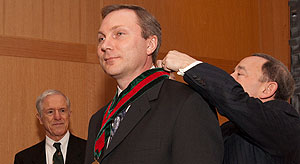Igor Efimov, Ph.D., the Lucy and Stanley Lopata Distinguished Professor of Biomedical Engineering in the School of Engineering & Applied Science, was installed in a ceremony Nov. 25 in Uncas A. Whitaker Hall.

This is the second professorship — both residing in the School of Engineering & Applied Science — given by Lucy and the late Stanley Lopata, significant benefactors of Washington University for many decades. In addition to these professorships, the Lopatas have generously supported a number of buildings and scholarships as well as the annual basketball tournament held each fall.
“Over the years, Lucy and Stanley Lopata’s generosity and guidance have made an enduring imprint on Washington University, leaving their mark throughout the Danforth Campus,” said Chancellor Mark S. Wrighton, speaking at the ceremony. “Thanks to their tremendous and enthusiastic support, we have been able to attract world-class faculty such as Igor Efimov.”
Although Stanley Lopata died in 2000, his devotion to his alma mater lives on through the good works of his wife, Lucy. Stanley graduated in 1935 with a degree in chemistry in Arts & Sciences. As a “sideline,” he began manufacturing chemical products, which grew into the multimillion-dollar enterprise, Carboline Co. After selling Carboline in 1980 to Sun Oil Refining and Marketing Co., he established another successful business, Lopata Research and Development. He also was a longtime trustee of the University.
In 1980, the Lopatas established their first professorship in chemical engineering. The Danforth Campus has been enriched by many facilities the Lopatas have supported, most notably Lopata Hall, three Lopata Courtyards (in engineering, business and social work), Lopata Classroom in McDonnell Hall and Lopata House in the Village.
The couple also created several school scholarships and the beloved Lopata Classic, WUSTL’s invitational basketball tournament, which came to be known as the “Brain Bowl.” For this key contribution, they were inducted into the University’s Sports Hall of Fame in 1992.
Numerous awards have been presented to Stanley and Lucy Lopata over the years, including honorary degrees, in 1993 and 2001, respectively, as well as the Robert S. Brookings Award, presented by the Board of Trustees for exemplary work in bridging the University and the community.
In 2000, the Lopatas were given the Jane and Whitney Harris St. Louis Community Service Award for their contributions to the St. Louis region. In addition, Stanley Lopata received the William Greenleaf Eliot Society’s “Search” award and the distinguished alumni award.
Efimov arrived at WUSTL from Case Western Reserve University in 2004. He began his career at the Institute of Biological Physics in Puschino, Russia, and then came to the United States, where he held positions at the Cleveland Clinic Foundation and the University of Pittsburgh School of Medicine.
Efimov has devoted his research to advancing the understanding of cardiovascular disease, identifying the underlying causes of fatal disturbances of cardiac rhythm known as arrhythmias and developing lifesaving therapies through pharmaceutical discoveries and implantable devices such as the pacemaker.
According to American Heart Association statistics, cardiovascular disease is the leading cause of death in developed nations, and the World Health Organization estimates that the gap between cardiovascular cause of death and all others will widen in the next century.
Through his investigations, Efimov and his research team have made inroads into the development of anti-arrhythmia therapies. These include low-energy painless defibrillation as well as working to engineer the pacemaker and the conduction system of the heart.
He is co-editor of a new book, “Cardiac Bioelectric Therapy: Mechanisms and Practical Implications,” which gives a historical survey of the development of pacing and electrophysiology and presents theories for future therapies.
Efimov earned advanced degrees at the Moscow Institute of Physics and Technology; he earned a master’s degree in 1986 and a doctorate in 1992.